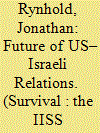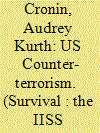| Srl | Item |
| 1 |
ID:
181191


|
|
|
|
|
| Summary/Abstract |
The special relationship between the United States and Israel has been built on three pillars: shared strategic interests, the resonance of Israel in American political culture and the influence of the pro-Israel lobby. While the strategic pillar has been the most controversial, as many in Washington have viewed Israel as a strategic liability, the dramatic improvement in relations between Israel and America’s Gulf Arab partners has diminished this concern. But the once strong cultural and domestic political pillars are now under strain. In the wake of a sharp decline in sympathy for Israel within the Democratic Party, bipartisan support for Israel is now in doubt. The new Israeli government has the potential to arrest and reverse this decline. Without progress towards a two-state solution to the Israeli–Palestinian conflict, however, the challenge will remain.
|
|
|
|
|
|
|
|
|
|
|
|
|
|
|
|
| 2 |
ID:
181190


|
|
|
|
|
| Summary/Abstract |
What should the future of US counter-terrorism policy be? This article reviews American strategic successes and mistakes of the past 20 years, including the wars in Iraq and Afghanistan. Drifting objectives, public intolerance of risk and a misguided counter-insurgency approach to counter-terrorism all yielded an undifferentiated global campaign of attrition that the United States could never win. As the years passed, tactics eclipsed strategic thinking altogether. Meanwhile, the impact of digital technology, a resurgent right-wing threat and rising major powers such as Russia and China altered the global context and required new thinking. The only way the United States can respond effectively, especially after the calamitous and credibility-sapping withdrawal from Afghanistan, is to build stronger links with capable allies and partners, and to reframe its approach. The future of US counter-terrorism demands moving beyond a symmetrical US global counter-insurgency approach and adopting a selective, asymmetrical strategy of strongpoint defence.
|
|
|
|
|
|
|
|
|
|
|
|
|
|
|
|